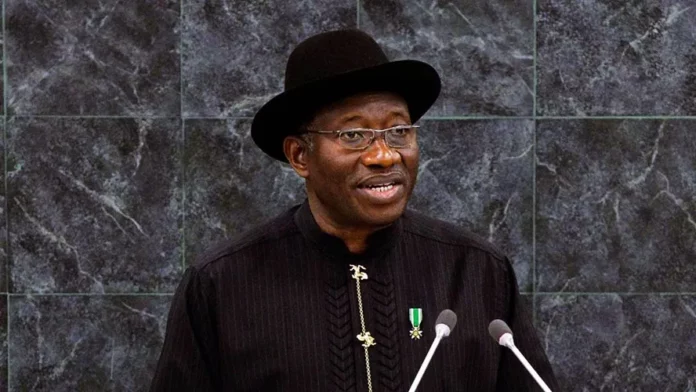The Federal Government on Thursday confirmed that former President Goodluck Ebele Jonathan is safe and has left Guinea-Bissau following the sudden military coup that toppled the country’s government. Jonathan had travelled to the West African nation as part of an international team observing Sunday’s presidential and legislative elections before soldiers announced they had taken control.
The spokesperson of the Ministry of Foreign Affairs, Kimiebi Ebienfa, told journalists in Abuja that Jonathan had been evacuated from the country along with members of his delegation. According to Ebienfa, the former president departed Guinea-Bissau on a special flight arranged for him and other senior officials who were part of the election observation mission.
“Former President Goodluck Ebele Jonathan is very safe and out of Guinea-Bissau. He left with a special flight with members of his delegation, including Mohamed Chambas,” Ebienfa said, referring to the former UN Special Representative for West Africa and the Sahel.
Jonathan had been leading the West African Elders Forum (WAEF) Election Observation Mission, a body that deploys former presidents and senior statesmen to monitor elections across West Africa. He arrived in Guinea-Bissau ahead of the country’s closely watched polls and had held meetings with political actors, security officials and civil society groups before violence erupted.
Guinea-Bissau was thrown into political turmoil on Wednesday when military officers announced they had seized power, suspended all electoral activities and taken “total control” of the country. Soldiers blocked major entry points into the capital, closed the country’s borders and stationed armed personnel around key government institutions.
Heavy gunfire was reported near the presidential palace in Bissau, and residents were ordered to stay indoors. General Denis N’Canha, who heads the presidential military office, declared that a command made up of all branches of the armed forces had taken over leadership of the country “until further notice.”
In a telephone interview with France24, incumbent President Umaro Sissoco Embaló said simply, “I have been deposed.” The president had earlier claimed victory in the election, even as opposition candidate Fernando Dias also declared himself winner before official results were released.
The military claimed it uncovered a conspiracy involving prominent “national drug lords” and the importation of weapons. According to the coup leaders, these groups were allegedly working with political actors to “alter the constitutional order” and influence the outcome of Sunday’s elections. They insisted that their action was meant to “protect the nation,” though no evidence has been publicly presented.
Later on Thursday, in a surprising turn, the military announced that the country’s borders had been reopened. General Lansana Mansali, Inspector General of the Armed Forces, made the announcement, saying “all borders are now open,” even as uncertainty continued.
The coup has drawn widespread condemnation from regional bodies and election observers. In a joint statement on Wednesday, three heads of international observer missions—Filipe Nyusi, former president of Mozambique and leader of the African Union Election Observation Mission; Issifu Kamara, Head of the ECOWAS Election Observation Mission; and former Nigerian President Goodluck Jonathan—denounced the takeover.
The trio described the military action as an attempt to derail Guinea-Bissau’s democratic process and warned that it would plunge the country into deeper instability. They called on citizens to remain calm and promised that their organisations would continue to support Guinea-Bissau during what they called “this sensitive period.” They emphasised the need to maintain peace, stability and the general well-being of the Bissau-Guinean people.
Nigeria also strongly condemned the coup. The Ministry of Foreign Affairs, in a statement issued Thursday, said the government learned of the “unconstitutional change of government” with “profound dismay and deep concern.” Abuja insisted that the coup clearly violates the ECOWAS Protocol on Democracy and Good Governance, which forbids military intervention in politics and encourages peaceful transfer of power.
Nigeria’s reaction comes at a time when West Africa has witnessed a troubling rise in coups. Over the past four years, Mali, Burkina Faso, Guinea, and Niger have all experienced military takeovers. These coups have raised questions about the stability of democratic systems in the region, which ECOWAS and the African Union have repeatedly pledged to defend.
Guinea-Bissau, a small country of about two million people, has endured political instability for decades. Since gaining independence from Portugal in 1973, the country has suffered four successful coups and several attempted coups. No elected president has completed a full term in office without facing major political or military crises.
The country is also known as a major transit point for international drug trafficking networks, especially those transporting cocaine from Latin America to Europe. Analysts say this has contributed to high levels of corruption and internal conflict within the political and military establishment.
Ahead of Sunday’s elections, tension was already high. More than 6,700 security personnel—including members of the ECOWAS Stabilisation Force—had been deployed to maintain order. Observers feared that political disputes, allegations of corruption and mistrust among political parties could lead to unrest. The coup appears to have confirmed those fears.
In Nigeria, news of the coup quickly sparked concerns because of Jonathan’s presence in the country at the time. Since leaving office in 2015, Jonathan has become a respected regional statesman and has taken part in several peace and election monitoring missions across Africa.
His role in leading the WAEF delegation in Guinea-Bissau was part of efforts by elder statesmen to strengthen democratic institutions and prevent violence during elections. The Federal Government’s confirmation of his safety has reassured many Nigerians who were worried after reports of gunfire and border closures emerged.
As of Thursday evening, uncertainty remained over Guinea-Bissau’s political future. Both the ousted president, Embaló, and the military appeared to be consolidating their separate claims to authority. ECOWAS and the African Union were expected to meet to discuss the situation and decide on possible sanctions or diplomatic actions.
For now, the evacuation of Jonathan and other observers removes one immediate concern. However, the wider question of stability in Guinea-Bissau—and across the West African region—remains unresolved.

